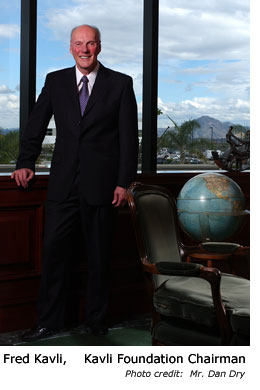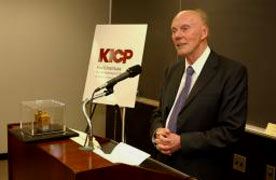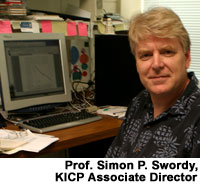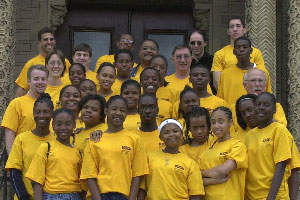 |
 |
 |
 |
 |
 |
 |
 |
 |
 |
|
KICP News
|
KICP News, 2004
Kavli Foundation Grant March 10, 2004  University of Chicago News Office The University of Chicago will devote $7.5 million in donations from Fred Kavli and the Kavli Foundation of Oxnard, Calif., to studying some of the most puzzling scientific questions about the origin and evolution of the universe and the laws that govern it. The funds will make permanent the Center for Cosmological Physics, established in 2001 by the National Science Foundation. The center will be renamed the Kavli Institute for Cosmological Physics. The new institute is one of seven being established by Kavli around the country and in Europe on brain science, nanoscience and cosmology. "My goal in establishing these institutes is to support research at the frontiers of science," said Kavli Foundation Chairman Fred Kavli. "I feel that it is especially important to pursue the most far-reaching opportunities and challenges and to seek answers to the most fundamental unanswered questions." Kavli said he selected the three areas of emphasis because they provide the greatest opportunity for major scientific breakthroughs. "We selected the University of Chicago primarily because of its research strengths in experimental and theoretical cosmology. The presence of an interactive group of outstanding researchers supported by an NSF Physics Frontier Center was also a factor." The University of Chicago is proud to have the Kavli name associated with its rich tradition of research in physics, astronomy and astrophysics, said University President Don Michael Randel. "This tradition includes our alumnus Edwin Hubble, who discovered 75 years ago that the universe is expanding. With the generous support of Fred Kavli and the Kavli Foundation, our scientists aim to make equally startling discoveries in the years ahead." More than 90 scientists and students at the new Kavli Institute carry out research that fuses cosmology with particle physics. Of particular interest to the institute's researchers are the following questions: why is the universe expanding at an accelerating rate, did the universe begin in a burst of expansion called inflation, and did a single unified force influence the beginning of the universe? The interdisciplinary work pioneered by David Schramm at the University of Chicago from 1974 until his death in 1997 has established that there are deep and profound connections between the very small-quarks-and the very large-the cosmos, said Michael Turner, the Bruce V. and Diana M. Rauner Distinguished Service Professor in Astronomy & Astrophysics. Over the past two decades, Chicago scientists have blazed the trails in this new approach to cosmology and particle physics. "The Kavli Foundation recognized the grand opportunities to dramatically advance our understanding of both the universe and the laws that govern it, and with this gift has expressed its confidence in the ability of scientists at Chicago to take advantage of those opportunities within our unique interdisciplinary culture," Turner said. Kavli Institute Director Bruce Winstein said it is now generally recognized that particle physics and cosmological physics are coming together very rapidly. "We think that is the most exciting and fruitful area in all the physical sciences, and it promises to remain that way for some time," said Winstein, who also is the Samuel K. Allison Distinguished Service Professor in Physics at the University of Chicago. "We are happy and proud that the Kavli Foundation has made this very generous gift to our university to enhance our NSF Center. The Kavli Institute for Cosmological Physics has a very strong fellows program that currently has 10 of the best young scientists hungry for this interdisciplinary environment. "Funding from the Kavli Foundation enables the expansion of our mission: understand the earliest moments of our universe identify the composition and character of 'dark matter' and 'dark energy' and understand their critical roles in the formation of galaxies and understand the origin of the very high-energy gamma and cosmic rays in the universe," Winstein said. The institute has already allocated $1 million of the Kavli funds to develop and build an instrument that will enable NSF's South Pole Telescope, led by John Carlstrom, the S. Chandrasekhar Distinguished Service Professor in Astronomy & Astrophysics at the University of Chicago, to make ultra-sensitive measurements of the polarization of the cosmic microwave background radiation, the afterglow of the big bang. Detection of particular patterns in this polarization can reveal the physics of the universe in its earliest imaginable stages. The Kavli Foundation was founded by Fred Kavli in 2000 to advance science for the benefit of humanity and to promote increased public understanding and support for scientists and their work. The foundation focuses its activities on three areas of basic research: cosmology, the life sciences with emphasis on understanding the nature and evolution of life and the human being, and nanoscience with initial emphasis on bio-nanotechnology. Kavli, a Norwegian-born physicist, business leader, innovator and philanthropist, came to the United States in 1956. Two years later he founded the Kavlico Corporation, which became one of the world's largest suppliers of sensors for aeronautic, automotive and industrial applications. Kavli and the foundation support nine research institutes worldwide. These include research institutes in neuroscience at Columbia University, Yale University and the University of California, San Diego in nanoscience at the California Institute of Technology, Cornell University and the Technical University in Delft, The Netherlands in cosmology at Stanford University and Chicago and in theoretical physics at the University of California, Santa Barbara. Contact: Steve Koppes 773-702-8366 Kavli Institute announcement April 30, 2004  New KICP Associate Director June 30, 2004  Related Links: KICP Members: Simon P. Swordy 2004 Yerkes Summer Institute, August 7-13 August 19, 2004  Members of the KICP and University community who helped make YSI 2004 a success included: Rich Kron, Monica Valluri, Randy Landsberg, Rick Kessler, Erin Sheldon, Kyle Cudworth, Carlos Cunha, Robert Friedman, Chris Greer, Sarah Hansen, Vivian Hoette, Thushara Perera, Andy Puckett, Douglas Rudd, Matthew Sharp, Eileen Sheu, Phil Wisecup, Brian Wilhite, and Charles Brass. Read more >> Related Links: KICP Members: Richard G. Kron; Randall H. Landsberg; Thushara A. Perera; Erin S. Sheldon; Monica Valluri KICP Students: Robert Friedman; Christopher Greer; Sarah M. Hansen; Douglas H. Rudd; Matthew Sharp |





 Overview
Overview